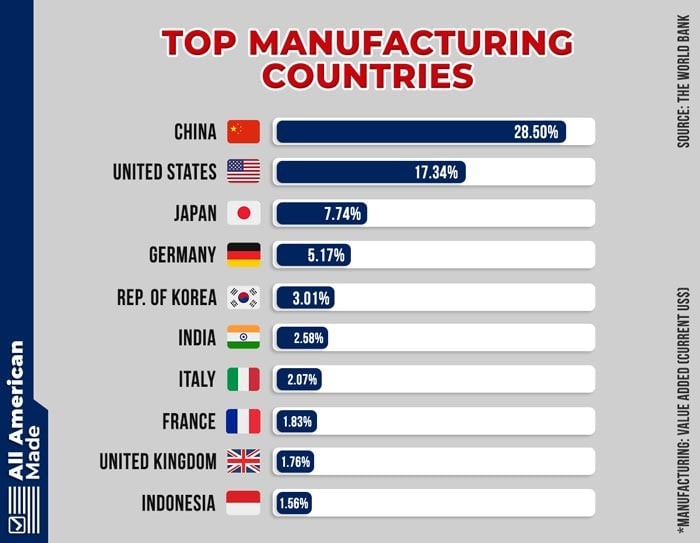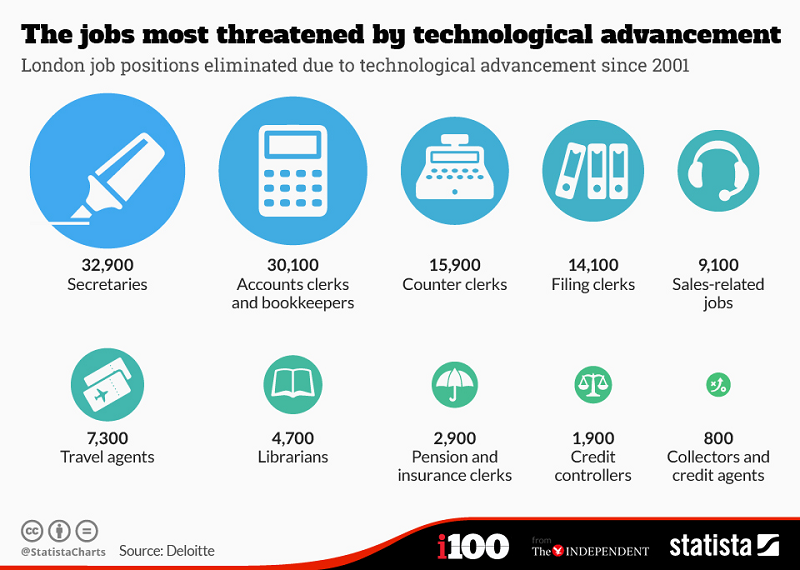Large-Scale Industries – Definition, Advantages, and Examples

The average large-scale industry hires more than 250 employees. These industries contribute significantly to the growth and development of the world economy. However, they can have negative and positive effects.
Apple being a champion in the tech industry has a market valuation of $2.544 trillion. Only seven countries have annual GDPs higher than Apple’s market value!
This article assesses how large-scale industries operate and what they bring to the table regarding economic growth.
Let's get started.
What Are Large-Scale Industries?
A large-scale industry is an industrial undertaking that employs, manufactures, distributes, or sells goods in mass.
They are capital-intensive and require huge infrastructure to start, unlike small-scale industries that require little capital to set up. You can separate a large-scale industry from a small or medium one by the monetary value of its fixed asset.

Industries dealing with heavy goods were originally the first large-scale industries. These heavy industries include iron and steel manufacturing, and textile manufacturing.
However, in today’s world, industries that don’t produce heavy goods are now major players in the economy. These light large-scale industries include software development and business consultancy.
Large-scale businesses can be multinational corporations because they operate in multiple countries. These industries engage in large-scale production and massive manufacturing units.
Countries set up tax benefits and favorable conditions to encourage the growth of large-scale businesses. These industries aim at generating employment opportunities and foreign direct investment.

Not all business structures are suitable for setting up a large-scale business. While a corporation and an LLC are a great fit for large-scale, a sole proprietorship model isn’t.
Advantages of Large-Scale Industries
Large-scale industries have many benefits for employees, employers, investors, and countries at large.
1. Job Opportunities
Large-scale industries generate employment opportunities for people in their location. Since they produce in-mass, they require a large number of skilled workforce.
These job opportunities can be direct (the company hires into their workforce) or based on contracts from other organizations.
Every country aims to reduce its unemployment rate to the lowest percentage possible. Large-scale industries provide job opportunities to lower the unemployment rate and make a positive impact on local economies.

2. Use of Machines
Large-scale industries are quick to adopt new technology trends. They are interested in investing in the latest machinery and technology that can change and improve their business.
Producing goods on a large scale is more effective with sophisticated machines. You use less skilled workers and reduce overhead costs. Other benefits include the speed of delivery, durability, and higher productivity.
3. Infrastructure Development
Large industries use heavy-duty trucks and machines for mobility. They invest in the infrastructural development of their location for ease of operations.
You will find large-scale industries constructing better transport and communication networks, pipe-born water, and hospitals in areas where they operate.
4. Economies of Scale
Large industries use less capital to produce more. The cost of each unit produced is lesser due to their ability to discounts for buying raw materials in bulk. When the product gets to the market, the cost is less, and more consumers can afford it.
5. Exportation
These industries perform transactions beyond the borders of their home country, thus boosting the country’s foreign exchange earnings and economic growth.
The generation of foreign currency is a norm for these enterprises. An industry exporting beverages to other countries will earn more depending on the exchange rate.

6. Easy Access to Loans
Large-scale businesses have easy access to credit facilities at cheaper rates because of the large fixed assets they possess. Financial institutions approach these industries with loans at a low-interest rate.
7. Skill and Career Development
Unlike small enterprises, large-scale industries create a conducive environment for self-development.
Employees can improve their skills and build their careers. The newly acquired skills make them relevant in related sectors and increase their income level as employees.

Problems of Large-Scale Industries
Despite the many benefits of large-scale industries, it is not without disadvantages.
1. Overproduction
Large-scale industries can produce more supplies than the market can handle. This error can lead to losses in capital, raw materials, and finished products. In addition, such activities can result in depression through the automatic fall in prices and excess supply.
2. Difficulty in Maintaining High Levels of Efficiency
One of the major challenges facing large-scale companies is meeting up with high levels of efficiency and keeping overhead costs at the nearest minimum.
This situation is practically impossible without advanced automation technologies, like robotics and artificial intelligence. Maintaining such technologies is quite costly but effective.

3. Non-Stop Innovation Research and Development
Large-scale industries spend a lot of resources on research and development. This investment is continuous. They require different innovations and fresh ways to stay ahead of their competitors and on track with market trends.
4. Impact of Globalization and International Trade
Globalization and international trade influence large-scale industries in terms positively and negatively.
Adapting to different cultures during international trade can be problematic for these industries. Additionally, competition is usually fierce and difficult to overcome when swimming in international waters.
5. Inadequate Supervision
Large-scale industries may have issues paying adequate attention to every detail in various departments due to their size and mode of operation. The organization can incur unnecessary losses due to inadequate supervision.
6. Monopoly
Large-scale industries can monopolize the production of valuable goods because of their massive size. They seamlessly achieve this feat because of the resources available to them and their reputation.
As great as this may sound, it has adverse effects on the local economy and small businesses. Many countries set regulations to prevent a group of companies from monopolizing lucrative markets and to protect their local small-scale companies.
7. Reliance on Foreign Markets
The foreign market offers many juicy opportunities but it has its negative side. Most large-scale industries depend on foreign markets for huge demand and supply.
The downside to this action is that the organization may take a main hit because of wars or unfavorable foreign policies.
Features and Characteristics of Large-Scale Industries
Understanding the features of large-scale industries helps bring us closer to their mode of operation.
Here are some of its major features;
- Mass Production: Large-scale industries deal in the arena of producing consumer goods and capital goods in mass. The production process of these goods requires a substantial amount of investment to run.
- Capital Intensive: Large-scale industries are capital intensive. They consume large capital investments to establish factories and machinery, pay employees, and keep the whole business running.
- Multiple Locations: A core feature of these industries is their ability to spread their tentacles around their location. They usually set up branches in various states or towns to extend their reach and meet demand appropriately.
- Skilled Employees: Large-scale industry employees are well-trained with a high level of expertise in their field. They employ skilled workforce who are masters in their field and give them required training while on the job. For example, their workers learn how to operate various machines.
- Advanced Technology: Small-scale industries mix indigenous and imported technologies in carrying out their activities. On the contrary, large-scale industries focus on advanced technology to create products. The amount of capital invested in such technology is mind-blowing.
- Multiple Supply Channels: Raw materials are vital tools of every large-scale industrial production process. They acquire their needed materials for various suppliers from within and outside the country.
Importance of Large-Scale Industries
The large-scale industry is a source of growth and development for the people in its location and the country.
Here is some importance of the large-scale industry.
- Economic Growth: Large-scale industries play a vital role in economic growth. They have a positive influence on local economies by reducing the high unemployment rate and community development. Additionally, they help to bring in foreign reserves that benefit the country as a whole.
- Large-Scale Production: Supplying goods that meet the needs of a country through the activities of a small-scale industry is practically impossible. Large-scale industries are indispensable. They play a vital role in maintaining the balance in a country's economy and the overall well-being of its citizens.
- Infrastructural and Community Development: Areas with large-scale industries enjoy various benefits like a stable electrical supply, an effective transport system, and community development schemes.
Large-Scale Industries Examples
There are various examples of large-scale industries functioning in different sectors. Let's take a look at the common ones.
- Energy Production: Energy production is vital to the survival of the human race. These industries generate energy in the form of electricity. The different types of energy production include natural gas, nuclear, coal, oil, and renewable energy.
- Transportation: Large-scale industries are involved in the transportation sector. They manufacture vehicles and relevant spare parts. Additionally, they produce various infrastructures required for seamless transportation. For example; roads, transport facilities, bridges, and ports.
- Construction: Large-scale construction companies are involved in the design, construction, and maintenance of buildings, plants, bridges, and roads.
- Steel Industry: The steel industry focuses on converting iron ore into steel. The steel industry emerged from the need to produce stronger metal seamlessly. Their activities include processing metal into semi-finished products or recycling scrap metal into steel.
- Jute Industry: In India, large-scale industries are popular with jute production. Jute is a useful ingredient for manufacturing relevant Hessian cloth, sacking, scrim, carpet backing cloth, and canvas. Indian industries are the largest producer of Jute worldwide.
- Textile Industry: The textile industry centers around the development, manufacture, production, and distribution of textiles. The required raw material like silk is processed into an elegant commodity ready for consumers' use.
- Food Processing Units: Agricultural processing is a key aspect of this industry. This industry transforms fresh farm products into well-processed food. Common food processing methods include cooking, pickling, salting and curing, freezing, drying, smoking, fermentation, and pasteurization.
- Automobile Manufacturing Industry: The automobile industry is in the business of producing and selling self-powered vehicles. These vehicles include passenger cars, motorbikes, trucks, farm equipment, and other commercial vehicles.
- Cement Industry: This industry uses dust, carbon dioxide and nitrogen oxides, and other ingredients to produce a rocky powder substance that is relevant in the construction sector.
- Metal Processing Industry: The metal processing industry heats metallic raw materials to form semi-solid metal and mechanically shapes it to form a particular product. These products include metal drums, tanks, and rails. Metal extraction is a major part of their activities.
- Insurance industry: The insurance industry comprises organizations and people who develop, sell, administrate, and regulate insurance policies. Some insurance companies develop products and employ agents to market them to the general public.
- Paper Industry: This industry uses wood as its main raw material to produce paper, pulp, paperboard, and numerous cellulose-based products. The paper industry has remained relevant for centuries due to the importance of paper in our daily lives.
- Service-based Industry: Service-based industries don't depend on the sales of goods, rather they offer specific services designed to meet customers’ unique needs. Examples of service-based industries include consumer services, retail services, economic services, business services, administrative services, and public services.